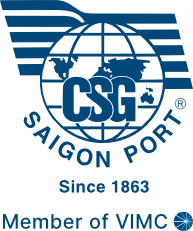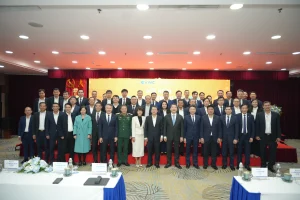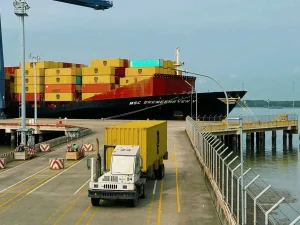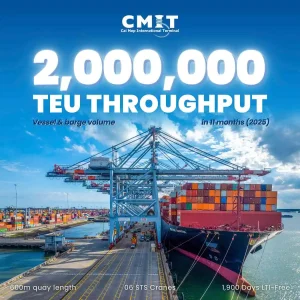Mergers and acquisitions in the logistics industry are yet to thrive this year, as economic headwinds continue to prevent major movements.
National shipping giant Vietnam Maritime Corporation (VIMC) is planning to divest its state stake from the current 99.46 per cent to 65 per cent to serve future development.

Mergers and acquisitions slow going in logistics sector until risks subside
Deputy general director Le Quang Trung told VIR, “The move is part of our effort to improve operational efficiency. We eye a potential investor who has similarity in business lines, strong technology expertise, strong financial capacity, and market development know-how.”
He added that the funding would enable the company to implement synchronous investment and development projects, including deep-water seaports in Lach Huyen, Lien Chieu, and Can Gio; investing in a fleet of container vessels; and the development of logistics infrastructure. The expected disbursement value is about $1.32 billion, with around $510 million being equity capital.
VIMC’s case would be promising for dealmaking in transport and logistics, but it might take time. Trinh Luong Ngoc, a lawyer at Vilaf, said that there will be no breakthrough in merger and acquisition (M&A) activities in the logistics industry in the short term as investors are still hesitant to make decisions.
“There will be just a few big deals involving domestic investors. This time is not favourable enough for foreign names to close deals because of global economic difficulties and the devaluation of VND. My clients have voiced concerns about risk of losses with the current exchange rate,” Ngoc said.
According to the Vietnam Logistics Business Association, the market has faced uncertainties driven by escalating tensions and instability in the Red Sea since last year, which has affected manufacturers, importers, and exporters who worry about instability in the global supply chain. As a result, logistics service providers have also suffered.
“However, having worked with many partners and companies, I find that there is a trend of increasing resilience among logistics companies globally amid the headwinds by adjusting business activities, restructuring, and doing M&As with companies in the same industry, and Vietnam is not an exception,” said vice chairman Trung Le. “Many international corporations are making shifts to Vietnam to seek partners. We will see it more clearly in the future.”
“A shift of production to Vietnam is taking place following recent visits by Chinese and US leaders, thus accompanied by large seaport corporations and logistics firms having interest in the Vietnamese supply chain of manufacturing and processing, as well as high-techs sphere,” he explained.
According to research from Orbis Research, most of Vietnam’s logistics service providers are small, providing low added value. Currently, the Vietnamese logistics market has more than 30,000 domestic businesses and 25 global forwarding corporations operating in many different business forms. Among them, 5,000 businesses are participating in international activities with around 70 logistics centres of medium to large scale.
In addition, there are about 30 transnational logistics service providers in Vietnam including DHL, FedEx, Maersk, APL, and more.
In 2023, the local market saw a few major logistics deals. Gemadept sold all 84.66 per cent of its equity in Nam Hai Dinh Vu Port JSC to Vietnam Container JSC, while PSA Cargo Solution Vietnam Investments bought 24.46 million shares of Southern Logistics JSC, equivalent to around 25 per cent of charter capital, at the price of nearly $55 million.
Experts, however, raised concerns over legal barriers to M&A logistics activities. Hong Sun, chairman of the Korea Chamber of Business in Vietnam, said that at present, local departments of planning and investment (DPIs) require approval when there is an increase in foreign ownership or for reasons related to national security under the legal framework.
“In cases of M&As among South Korean investors, approval is frequently demanded by DPIs even when there is no increase in foreign ownership. Consequently, the department, upon receiving an application, asserted that approval was unnecessary as there were no reasons such as an increase in foreign ownership,” Sun said.
“Therefore, due to the lack of coordination between internal departments, foreign-invested companies are spending unnecessary time and effort to resolve this issue. South Korean businesses request the abolition of unnecessary approval procedures for M&A activities.”
Meanwhile, despite the rapid development of the Vietnamese M&A market, local environmental, social, and governance regulations are still sparse and scattered across various different legal sources, according to a representative of the European Chamber of Commerce in Vietnam. This uncertainty is likely to hamper decisions and necessitate additional resources and spending on the environmental due diligence side of M&A deals.
“Vietnam has been working on improving its economic competitiveness, which is already leading to an increase in inbound investments. However, the country often faces challenges in cross-border M&As due to its existing regulations,” he said.
“To reach the next maturity level in the market, it needs to define clear thresholds and comply with approval deadlines. Vietnam should also consider bolstering administrative resources for efficient processing and communication,” he continued.
By Bich Thuy – vir.com.vn





